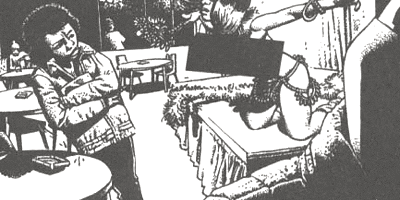| | operative network | writing archive: columns - reviews - interviews - features
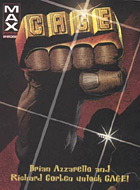 Marvel Comics has made a big deal about its plans for this February. In "recognition" of Black History Month, one of the company's oldest Black characters is getting a revamp in a prestigious format, with results that are far from complimentary. Marvel's depiction has caused a great deal of consternation amongst some Black comic book fans (they actually exist), and has avoided scrutiny from the world at large due to the comic book industry's low profile in terms of sales and marketing.
Marvel Comics has made a big deal about its plans for this February. In "recognition" of Black History Month, one of the company's oldest Black characters is getting a revamp in a prestigious format, with results that are far from complimentary. Marvel's depiction has caused a great deal of consternation amongst some Black comic book fans (they actually exist), and has avoided scrutiny from the world at large due to the comic book industry's low profile in terms of sales and marketing.
The original announcement on Comicon.com's Newsarama said, "While two MAX series, CAGE and Blade were slated to begin in February in partial recognition of Black History Month, [Marvel Editor-in-chief Joe] Quesada said that due to scheduling changes, only CAGE, by Brian Azzarello and Richard Corben will debut that month." According to the series editor Axel Alonso, another Vertigo alum, "It's gonna have the pacing and rhythm of your favorite Blaxploitation flicks of the '70s, only it'll be in a more modern context. Part and parcel of that is cussing and big booties, guns and drugs and all the rest."
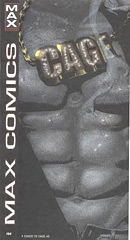 Early press materials on the series, released through Diamond Comic Distributor's Previews magazine note the title character returning to the slums of Harlem and life on the streets. He is hired by a grieving mother whose daughter was accidentally gunned down in a gang crossfire. He comes into conflict with both rival gangbangers and corrupt cops in his pursuit of "street justice" for a fee. He makes his way through strip clubs and bars, sans shirt and with his jeans unbuttoned at the top, all glowering stares and clenched fists. In the second issue, to upset a stalemate between three warring gangs, he offers his super-strong, bulletproof "services" to the gang willing to pay him the most.
Early press materials on the series, released through Diamond Comic Distributor's Previews magazine note the title character returning to the slums of Harlem and life on the streets. He is hired by a grieving mother whose daughter was accidentally gunned down in a gang crossfire. He comes into conflict with both rival gangbangers and corrupt cops in his pursuit of "street justice" for a fee. He makes his way through strip clubs and bars, sans shirt and with his jeans unbuttoned at the top, all glowering stares and clenched fists. In the second issue, to upset a stalemate between three warring gangs, he offers his super-strong, bulletproof "services" to the gang willing to pay him the most.
When contacted for comment, Marvel's Bill Rosemann said, "our plans to celebrate Black History Month, due to the availability of creators, never came to fruition. We had planned to launch three separate series starring African American protagonists, but instead will stagger these debuts over the coming year. Hopefully we'll be able to recognize this celebrated month in 2003."
This was part of Marvel's "recognizing" Black History Month: depicting a Black character in a somewhat unflattering light (and a far less mature light than any other character that has been in its stable of licensed properties)? It seems unusual that Marvel was unable to hire any actual Black people to work on the project due to "availability," because of the industry's experienced Black comic book writers, only two have monthly series (Doselle Young on The Monarchy, due to be cancelled in March, and Christopher Priest on the critically acclaimed Black Panther). Perhaps an actual African American voice would have changed some of the slant of this project, which has all the trappings of college frat boys who have just discovered Shaft and begin to mockingly emulate everything "Black" as something "cool" before they graduate and go on to white lives. We'll never know, as this series is slated to hit the stands February 27.
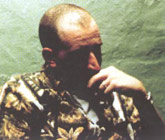 Rosemann said, "[Series editor Axel Alonso] did, in fact, speak with a number of African American writers about CAGE. One of the writers he spoke with has, in fact, elected to write another series featuring an African American lead character, to be illustrated by an African American artist. This other project—the details of which are yet to be released—should come out shortly after CAGE. That said, however, as with all comics we produce, we seek out the right talent for the right project. Race, sexual orientation, age, gender, or religion is never a qualifying factor. We're interested in the voice, not the mouth it comes out
of."
Rosemann said, "[Series editor Axel Alonso] did, in fact, speak with a number of African American writers about CAGE. One of the writers he spoke with has, in fact, elected to write another series featuring an African American lead character, to be illustrated by an African American artist. This other project—the details of which are yet to be released—should come out shortly after CAGE. That said, however, as with all comics we produce, we seek out the right talent for the right project. Race, sexual orientation, age, gender, or religion is never a qualifying factor. We're interested in the voice, not the mouth it comes out
of."
Azzarrello is commonly seen in the comic book community as one who has a firm grasp on urban life and street lingo. He is best known for his Tarantino-esque use of the "N" word in his Vertigo crime comic 100 Bullets and the exploits of roguish British magician John Constantine in Vertigo's Hellblazer. From these depictions, his "street cred" seemed solid enough to portray Harlem.
Luke Cage has, even if you want to look at the last three or four years, undergone significant character development that makes this series a throwback to a Cage that existed decades ago. He's not a street level hero in this direction. Luke Cage has traveled the world, and would not charge a grieving mother to look for her daughter's killer, if he would take such a case at all, given the international scope of his work (Heroes For Hire, Black Panther, and so forth). No explanation is given for his exaggerated, field-hand-ish changes in wardrobe (after all these years, and his dedication to style, why would he not be in a suit?) and it's a hard sell if one is produced. Five issues to find a killer on this scale? With his connections alone, he should have been able to make two phone calls—one to Black Panther for technical support and one to his old friend private detective Colleen Wing for an apropos stoolie—and been done in twelve pages.
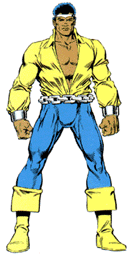 "Black comic books fans have a right to be upset about Luke Cage. Of course you can always find an audience for this kind of 'entertainment,' just as you did with Blaxploitation films of the '70s," said Marsha Mitchell, communications manager for the South Central Los Angeles Regional Center for Persons with Developmental Disabilities, herself a longtime activist with young people. "But once again, it's at the expense of the Black, male image. The revival of this character, in this new format, is damaging because it continues the trend that even in heroism, the Black man is portrayed as menacing, not wholly honest and as a physical specimen. The problem with this particular character is the demographic audience he's being conveyed to, i.e. white, 13- to 25-year-old males who will grow up believing in and perpetuating these kinds of stereotypes."
"Black comic books fans have a right to be upset about Luke Cage. Of course you can always find an audience for this kind of 'entertainment,' just as you did with Blaxploitation films of the '70s," said Marsha Mitchell, communications manager for the South Central Los Angeles Regional Center for Persons with Developmental Disabilities, herself a longtime activist with young people. "But once again, it's at the expense of the Black, male image. The revival of this character, in this new format, is damaging because it continues the trend that even in heroism, the Black man is portrayed as menacing, not wholly honest and as a physical specimen. The problem with this particular character is the demographic audience he's being conveyed to, i.e. white, 13- to 25-year-old males who will grow up believing in and perpetuating these kinds of stereotypes."
Los Angeles-area comic book fan and aspiring writer Khalil Asadullah had this to say: "These images are tinted windows that give no credence to the true culture of life in Black America; instead, they become
painful memories of a time long lost to blissful amnesia."
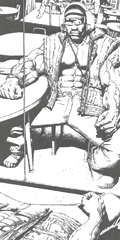 Los Angeles-based educator, poet and author of Hand Me My Griot Clothes: The Autobiography of Junior Baby had this to say when he saw Marvel's preview materials: "This is just another case of riffing on riffs which were never anything but ersatz blackness in the first place. It continues in the long American cultural tradition of mistaking 'hep' for hip, which stretches from at least minstrelsy to Hip Hop. It's to be expected from each new generation of wannabes who still claim their cultural authenticity by making money off their version of what's Black... Black style, Black folk, Black power. Doesn't sound like a comic book I'd want to read." When asked about the possible impact on children, being drawn back to comic book stores by the likes of this summer's Spider-Man movie, Harris responded, "I wish they didn't have to see this, but there's no way to stop them. In the end, I encourage them to read everything critically and work with collaborators of their choosing to critique what is and create what doesn't exist."
Los Angeles-based educator, poet and author of Hand Me My Griot Clothes: The Autobiography of Junior Baby had this to say when he saw Marvel's preview materials: "This is just another case of riffing on riffs which were never anything but ersatz blackness in the first place. It continues in the long American cultural tradition of mistaking 'hep' for hip, which stretches from at least minstrelsy to Hip Hop. It's to be expected from each new generation of wannabes who still claim their cultural authenticity by making money off their version of what's Black... Black style, Black folk, Black power. Doesn't sound like a comic book I'd want to read." When asked about the possible impact on children, being drawn back to comic book stores by the likes of this summer's Spider-Man movie, Harris responded, "I wish they didn't have to see this, but there's no way to stop them. In the end, I encourage them to read everything critically and work with collaborators of their choosing to critique what is and create what doesn't exist."
When confronted with this kinds of criticism, Marvel's Rosemann said, "I would ask them to wait until the entire series is actually published before they judge it. Forming a decision based upon a few pieces of art and some quick soundbytes isn't worthy of their time, effort or intelligence."
As a person of African descent, this writer was deeply enraged by the material shown here, and wondered why this trend didn't die down when Quentin Tarantino's career hit the skids with the arrogance of Jackie Brown and Switchblade Sisters, trying to repackage trashy Black imagery for trendy white audiences. Admittedly, Luke Cage has never been the ideal of Black manhood that many would like, spending most of his career in '70s-inspired, open-shirted wear and often seen with a chain as a belt. However, the idea that this character, who had his powers more than a decade, who less than six months ago was flying
high-technology airplanes and who has traveled the world many times over, would still be trafficking in "street justice" and looking like an escapee from a Ja Rule video is pretty ridiculous. Considering Marvel also publishes the intricate and well-developed Black Panther, coincidentally written by a creator of African descent (Christopher J. Priest), it's alarming that it would be able to fly so far to the other extreme of caricature. This writer hopes Marvel won't dig further into its past for an update of Waku, Prince of the Bantu, complete with HIV, cholera and malnutrition.
Nevertheless, the Black community continues to be splintered from within, leading to lampooning from without, and we'll all be staring at Cages and their like for some time to come.
Hannibal Tabu is a writer and web producer living in South Los Angeles with his wife. He swore, months ago,that CAGE would not go unanswered. Hannibal records all his triumphs and foibles at his Web site, www.operative.net.
|

 Marvel Comics has made a big deal about its plans for this February. In "recognition" of Black History Month, one of the company's oldest Black characters is getting a revamp in a prestigious format, with results that are far from complimentary. Marvel's depiction has caused a great deal of consternation amongst some Black comic book fans (they actually exist), and has avoided scrutiny from the world at large due to the comic book industry's low profile in terms of sales and marketing.
Marvel Comics has made a big deal about its plans for this February. In "recognition" of Black History Month, one of the company's oldest Black characters is getting a revamp in a prestigious format, with results that are far from complimentary. Marvel's depiction has caused a great deal of consternation amongst some Black comic book fans (they actually exist), and has avoided scrutiny from the world at large due to the comic book industry's low profile in terms of sales and marketing.
 Early press materials on the series, released through Diamond Comic Distributor's Previews magazine note the title character returning to the slums of Harlem and life on the streets. He is hired by a grieving mother whose daughter was accidentally gunned down in a gang crossfire. He comes into conflict with both rival gangbangers and corrupt cops in his pursuit of "street justice" for a fee. He makes his way through strip clubs and bars, sans shirt and with his jeans unbuttoned at the top, all glowering stares and clenched fists. In the second issue, to upset a stalemate between three warring gangs, he offers his super-strong, bulletproof "services" to the gang willing to pay him the most.
Early press materials on the series, released through Diamond Comic Distributor's Previews magazine note the title character returning to the slums of Harlem and life on the streets. He is hired by a grieving mother whose daughter was accidentally gunned down in a gang crossfire. He comes into conflict with both rival gangbangers and corrupt cops in his pursuit of "street justice" for a fee. He makes his way through strip clubs and bars, sans shirt and with his jeans unbuttoned at the top, all glowering stares and clenched fists. In the second issue, to upset a stalemate between three warring gangs, he offers his super-strong, bulletproof "services" to the gang willing to pay him the most.  Rosemann said, "[Series editor Axel Alonso] did, in fact, speak with a number of African American writers about CAGE. One of the writers he spoke with has, in fact, elected to write another series featuring an African American lead character, to be illustrated by an African American artist. This other project—the details of which are yet to be released—should come out shortly after CAGE. That said, however, as with all comics we produce, we seek out the right talent for the right project. Race, sexual orientation, age, gender, or religion is never a qualifying factor. We're interested in the voice, not the mouth it comes out
of."
Rosemann said, "[Series editor Axel Alonso] did, in fact, speak with a number of African American writers about CAGE. One of the writers he spoke with has, in fact, elected to write another series featuring an African American lead character, to be illustrated by an African American artist. This other project—the details of which are yet to be released—should come out shortly after CAGE. That said, however, as with all comics we produce, we seek out the right talent for the right project. Race, sexual orientation, age, gender, or religion is never a qualifying factor. We're interested in the voice, not the mouth it comes out
of."  "Black comic books fans have a right to be upset about Luke Cage. Of course you can always find an audience for this kind of 'entertainment,' just as you did with Blaxploitation films of the '70s," said Marsha Mitchell, communications manager for the South Central Los Angeles Regional Center for Persons with Developmental Disabilities, herself a longtime activist with young people. "But once again, it's at the expense of the Black, male image. The revival of this character, in this new format, is damaging because it continues the trend that even in heroism, the Black man is portrayed as menacing, not wholly honest and as a physical specimen. The problem with this particular character is the demographic audience he's being conveyed to, i.e. white, 13- to 25-year-old males who will grow up believing in and perpetuating these kinds of stereotypes."
"Black comic books fans have a right to be upset about Luke Cage. Of course you can always find an audience for this kind of 'entertainment,' just as you did with Blaxploitation films of the '70s," said Marsha Mitchell, communications manager for the South Central Los Angeles Regional Center for Persons with Developmental Disabilities, herself a longtime activist with young people. "But once again, it's at the expense of the Black, male image. The revival of this character, in this new format, is damaging because it continues the trend that even in heroism, the Black man is portrayed as menacing, not wholly honest and as a physical specimen. The problem with this particular character is the demographic audience he's being conveyed to, i.e. white, 13- to 25-year-old males who will grow up believing in and perpetuating these kinds of stereotypes."  Los Angeles-based educator, poet and author of Hand Me My Griot Clothes: The Autobiography of Junior Baby had this to say when he saw Marvel's preview materials: "This is just another case of riffing on riffs which were never anything but ersatz blackness in the first place. It continues in the long American cultural tradition of mistaking 'hep' for hip, which stretches from at least minstrelsy to Hip Hop. It's to be expected from each new generation of wannabes who still claim their cultural authenticity by making money off their version of what's Black... Black style, Black folk, Black power. Doesn't sound like a comic book I'd want to read." When asked about the possible impact on children, being drawn back to comic book stores by the likes of this summer's Spider-Man movie, Harris responded, "I wish they didn't have to see this, but there's no way to stop them. In the end, I encourage them to read everything critically and work with collaborators of their choosing to critique what is and create what doesn't exist."
Los Angeles-based educator, poet and author of Hand Me My Griot Clothes: The Autobiography of Junior Baby had this to say when he saw Marvel's preview materials: "This is just another case of riffing on riffs which were never anything but ersatz blackness in the first place. It continues in the long American cultural tradition of mistaking 'hep' for hip, which stretches from at least minstrelsy to Hip Hop. It's to be expected from each new generation of wannabes who still claim their cultural authenticity by making money off their version of what's Black... Black style, Black folk, Black power. Doesn't sound like a comic book I'd want to read." When asked about the possible impact on children, being drawn back to comic book stores by the likes of this summer's Spider-Man movie, Harris responded, "I wish they didn't have to see this, but there's no way to stop them. In the end, I encourage them to read everything critically and work with collaborators of their choosing to critique what is and create what doesn't exist." 